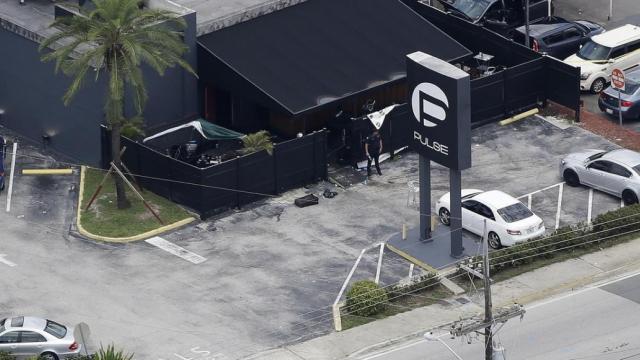
The gunman who opened fire at a gay nightclub in Orlando, Florida early Sunday morning may have targeted the location because he harbored anti-LGBT views, his father told NBC News. Mir Seddique explained that his son expressed anger after seeing two men kissing in Miami. "This had nothing to do with religion," Seddique said.
Omar Mateen — the man law enforcement officials identified as the shooter — died in a gun battle with police at Pulse after he killed at least 50 people and injured 53 others.
Authorities haven't called the shooting a hate crime. But it may be the deadliest attack against the LGBT community in U.S. history. As President Barack Obama noted on Sunday, it is also the country's deadliest mass shooting to date.
It's the irony of LGBT Americans' increasing visibility: With the Supreme Court's legalization of same-sex marriage nationwide last June and a national focus on transgender rights this spring, the LGBT community has become easier to target.
More than 250,000 Americans above age 12 were victims of hate crimes from 2007 to 2011, according to a 2013 study from the U.S. Department of Justice. Available numbers show lesbian, gay, bisexual, transgender and HIV-affected people are disproportionately the targets of hate crimes, including those where race, national origin or religion may also be a motivating factor. But only a third of all hate crimes are ever reported to law enforcement.
What's more, many hate crimes that are reported to law enforcement don't end up in the FBI's tally. A recent Associated Press investigation found that thousands of law enforcement agencies have failed to report hate crimes to the FBI. More than 2,700 city police and county sheriff's departments, or 17% of all agencies, have not submitted a single hate crime report in the past six years, according to the AP.
"We're pretty good about gang activity and murders, but the problem of hate crimes doesn't seem to exist in the minds of anybody," Heidi Beirich, director of the Southern Poverty Law Center's Intelligence Project, said in a phone interview. "This is a bit of a crisis situation."
More than 8 million people, or 3.5% of the U.S. population, openly identified as lesbian, gay, bisexual or transgender in 2011, according to a study by the Williams Institute, a public policy organization that does research on sexual orientation and gender identity.
The Orlando shooting occurred during the month of Pride, when the LGBT community seeks to create awareness around discrimination, violence, politics and health-related issues. In addition to Sunday's shooting, police in Los Angeles arrested a man with guns and ammunition in his car who was allegedly planning to attend the city's Pride parade, and police in Washington, D.C. stepped up security at the celebrations there.
"While the full facts are still unknown, unfortunately it is not surprising that the LGBT community was targeted," the SPLC said in a statement released Sunday. "This community has long been vilified by those opposed to LGBT rights and is too often the target of violent hate crimes."
The Anti-Defamation League's Florida branch said the Orlando LGBT community should know that it isn't being forgotten in the scramble to determine Mateen's true motivations. "As we have just marked the beginning of Pride month, together as a society we stand resolute that hate shall not diminish the pride of tolerance, the pride of acceptance, and the pride of unity," Hava Holzhauer, the ADL's Florida regional director, said in a statement Sunday.
Mateen, 29, had been licensed to work in professional security. The FBI revealed that it had monitored Mateen for a few years, after he expressed sympathy for Islamic State militants. Before Sunday's shooting, he pledged allegiance to ISIS in a 911 call to police, one U.S. law enforcement official said. Militants operating in the Middle East have been known to target, torture and murder people who they believe are gay.
In a statement delivered at the White House on Sunday, Obama indicated that federal authorities were investigating Mateen's actions as a terror attack. The president also called it a "heartbreaking day" for LGBT people.
"The shooter targeted a nightclub where people came together to be with friends, to dance and to sing, and to live," Obama said. "The place where they were attacked is more than a nightclub. It's a place of solidarity and empowerment where people have come together to raise awareness, to speak their minds, and to advocate for their civil rights."
3 WAYS TO SHOW YOUR SUPPORT
- Log in to post comments











